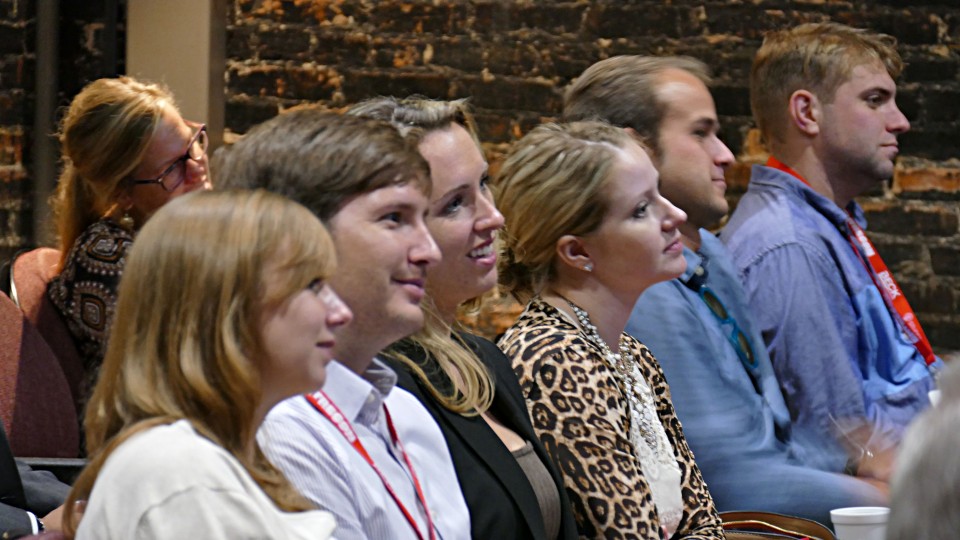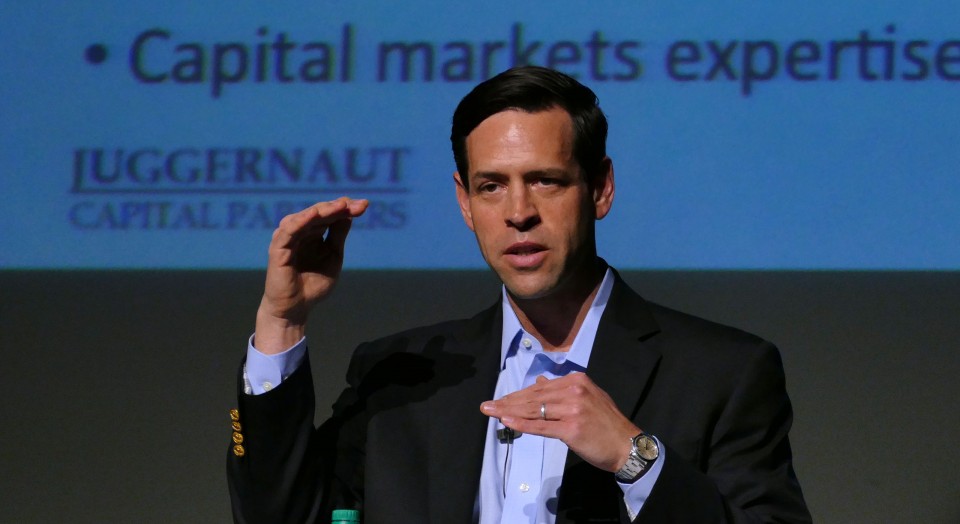EntreCon's lessons learned, advice shared
- November 7, 2015
- / Carlton Proctor
- / entrecon

Fans of EntreCon listen to Quint Studer speak on Friday at the Rex.
Pensacola's first EntreCon, a two-day symposium on entrepreneurship and business development, finished with a flourish Friday, featuring two homegrown rising stars.
Jeff Phillips and Justin Beck, both Pensacola natives, shared their experiences starting a new business, and expanding an established company.
Phillips is founder and CEO of Accountingfly, a national search company that specializes in matching college graduates with accounting firms.
Beck has taken the reins of Beck Properties, now called Beck Partners, and developed it into an innovating real estate management and insurance services firm.
Both sat on a panel Friday moderated by Independent News owner and publisher Rick Outzen.
As a young entrepreneur, Phillips said running and growing Accountingfly is an exercise in persistence and staying power.
TAKEAWAYS
The Studer Community Institute asked several attendees what their main takeaways were from EntreCon. Here is a selection of their responses:
"I enjoyed Chuck Dieveney. I’m not business-oriented, but his venture capital explanation was well-focused; it helped me understand that business, and how/why Quint Studer sold the Studer Group. I was most impressed by Quint’s efforts to bring in a few, valuable heavy hitters, and gathering some of Pensacola’s established entrepreneurs and wannabes to learn and network. Quint's truly a firestarter." Dick Rizzo, director of communications, Nowak Enterprises, Inc.
"My big takeaway was that I just really enjoyed hearing Michael Murdoch (AppRiver) and Bill Wein (IMS Expert Services) share their vision about how they took and idea and expanded on it. And the fact that they recognized Pensacola by keeping their companies here." Greg Threadgill, general manager, The McPherson Companies.
"My biggest takeaway was hearing these successful entrepreneurs talk about the importance of taking your values and transferring them to your employees, and applying your vision to them so they can help take your company to the next level." Kelby Thornton, University of West Florida graduate student.
"I think this has been very effective. I've enjoyed the two days. I've gotten a lot of really good information. I think it's been helpful for those who want to build a $100,000 a year business, or a $10 million a year business." Lawrence Tinker, PhD., Florida Institute for Commercialization of Public Research.
"It's all been great. I've enjoyed both days and learned a lot, I especially enjoyed listening to Mr. Dieveney, and the panel of bankers and financial experts that spoke on Thursday about how to develop a financing strategy for a startup company. The finance stuff, and the information I got from the legal panel today, those were the things that really stood out most for me." Thomas Duke, University of Mobile graduate student.
"This has made me really want to go talk to these entrepreneurs and ask them when did you decide you were an idea person, and how did you separate your company from the others in your field." Susan Campbell, owner Susan Campbell Jewelry.
"Our business model is that we live on the brink of failure or success every day," Phillips said. "Our strategy for building our business is that we must get accounting firms to pay us to recruit top talent with accounting majors.
To do this effectively and efficiently, Phillips said Accountingfly uses a highly specialized software they've developed.
One of the most important factors in building a startup company, Phillips said, "is to know exactly what problem you're going to solve for your customers.
"When we go in to pitch our product and service, you learn that you have to be very quick and get right to the point when pitching your company," he said. "You have to tell them the problem you're going to solve for them. You have to know where their pain is, and how to get rid of it."
Phillips offered some sound advice for would-be entrepreneurs: 'Raise as much capital as you can because your budget plan is probably wrong and startup costs very often are twice what you thought they would be."
Although Beck Properties was started by Greg Beck, Justin Beck's father, more than 30 years ago, Justin engaged his entrepreneurial spirit and has expanded the business model of the company, and has added an insurance company to its portfolio.
Beck agreed with Phillips about having sufficient capital in hand before launching a new company.
"You have to have more money that you think you'll need," he said. "You've got to have a healthy margin of safety. Think optimistically, but plan pessimistically."
Earlier Friday, EntreCon attendees, gathered at the renovated historic Rex Theater, now owned by Harvest Church, heard from venture capital expert Chuck Dieveney. Dieveney’s firm bought a majority share of Studer Group in 2011 for $217 million.

Chuck Dieveney, managing director of Juggernaut Capital Partners, was the opening speaker for the EntreCon seminar Friday morning at The Rex Theatre.
The firm sold Studer Group, founded by Quint Studer as a healthcare consulting firm in 1998, this year to Chicago-based Huron Consulting Group for $325 million.
A principal in the Maryland-based Juggernaut Capital Partners, Dieveney said that startup companies searching for seed money, or an investment from a venture capital firm, must have five, verifiable features:
1) Extremely strong customer relationships.
2) Involved in a strong market poised for more growth.
3) Be very profitable.
4) Competitive in the market in which they exist.
5) Strong CEO and management team.
Dieveney also explained the difference between a loan from a bank or other lending institution, and an investment by a venture capital firm.
"If you get a loan from a bank for, say $2 million, the bank is going to want one thing: Their money back," he said. "A venture capital company only makes money if your company increases in value."
Although a business owner may have to give up some, or a large percentage of, control of their company, having a venture capital firm on board "gives you another set of eyes watching over your business.
"A venture capital firm helps you see around the corner and anticipate the next challenges you will face," Dieveney said.
He also shared some advice, similar to advise heard from several others speakers over EntreCon’s two days.
"Decide on your true dreams and goals. Be persistent, and work hard. Never stop learning," he said. "It's hard to beat a person who never gives up, and winners never give up."
 CivicCon launches with a look at good growth in cities
CivicCon launches with a look at good growth in cities
 Building stronger brains one baby, one parent at a time
Building stronger brains one baby, one parent at a time
 SCI debuts commercial on Early Learning City
SCI debuts commercial on Early Learning City
 Entrecon: World class speakers and an opportunity to sharpen skills
Entrecon: World class speakers and an opportunity to sharpen skills
 PYP Quality of Life survey 2017
PYP Quality of Life survey 2017
 EntreCon Pensacola 2016: A look back
EntreCon Pensacola 2016: A look back
 Leadership tip: getting better employee takeaways
Leadership tip: getting better employee takeaways
 Leadership tip: be interested instead of interesting
Leadership tip: be interested instead of interesting
 Leadership tip: delivering difficult messages
Leadership tip: delivering difficult messages
 Brain Bags boost Arc, Early Childhood Court programs
Brain Bags boost Arc, Early Childhood Court programs